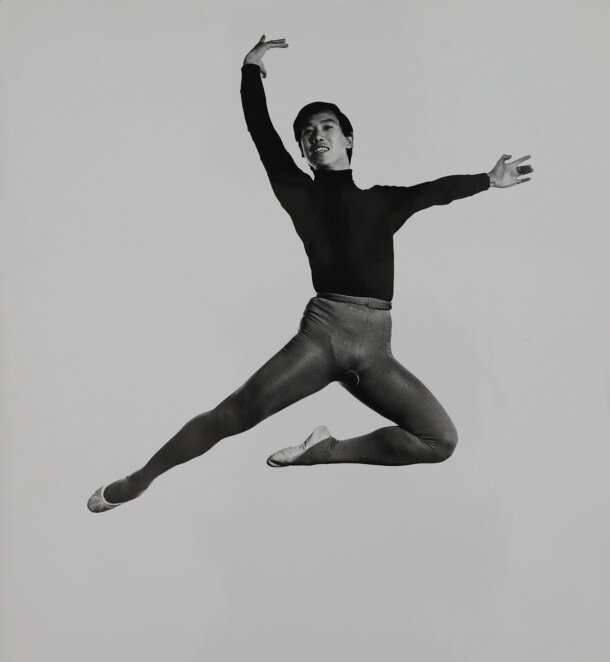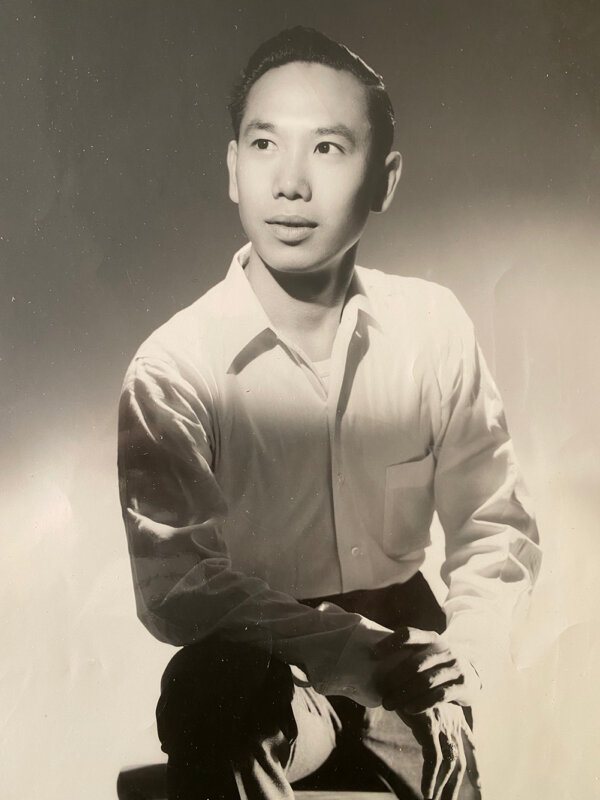Discover the astonishing and heartwarming story of George Lee.
L ee was a pioneering Asian dancer who originated a featured role in George Balanchine’s The Nutcracker 70 years ago as a teenage immigrant from China. He has been a prodigy, a refugee, an immigrant and a pioneer in the dance world. Now, up until his passing on April 20, 2025, he had been a blackjack dealer in Las Vegas, a humble and beloved figure at the Four Queens Hotel & Casino who worked five days a week.
ee was a pioneering Asian dancer who originated a featured role in George Balanchine’s The Nutcracker 70 years ago as a teenage immigrant from China. He has been a prodigy, a refugee, an immigrant and a pioneer in the dance world. Now, up until his passing on April 20, 2025, he had been a blackjack dealer in Las Vegas, a humble and beloved figure at the Four Queens Hotel & Casino who worked five days a week.
Ten Times Better tells George Lee’s uniquely American story of perseverance in the face of hardship, of talent overcoming long odds, and a reminder of the remarkable lives behind the anonymous faces all around us. The 30-minute documentary is set against the sweep of history—war, hunger, dislocation—and ranges from occupied Shanghai to the Philippine jungles to midcentury Manhattan, and finally the glitzy lights of Vegas. Archival film, personal photographs and vintage television footage bring the story to life, along with contemporary interviews.
George Lee was born in Hong Kong in 1935 to a Polish ballerina; his father was a Chinese acrobat who was serving as a military translator when he died in a truck accident in the mountains of China. After moving to Shanghai in 1941, Lee’s mother, Stanislawa Lee, trained her son in the rigors of classical ballet, as she had been taught by Russian instructors at the Warsaw Opera. George Lee also attended ballet class with adult Russians, part of the large Russian community in Shanghai. George danced as a child novelty act in nightclubs, sometimes paid in rice. When the Chinese civil war threatened in 1949, mother and child fled with thousands of Eastern Europeans in a United Nations-sponsored ship that deposited them in the Tubabao refugee camp in the Philippines. They stayed for two years before a family friend sponsored their move to New York City. There, the family friend arranged for an audition at the School of American Ballet, the training ground for the fledgling New York City Ballet, founded just three years earlier.
 George Lee, despite not dancing for two years in the refugee camp, drew on his years of training to nail the audition and receive a scholarship. In 1954, as Balanchine was working on his new version of Tchaikovsky’s 1892 ballet The Nutcracker. For a divertissement called “Tea,” meant to evoke China, he cast George Lee, then 18. The choreographer asked the teenager what his strengths were—he demonstrated leaps, splits and spins—and incorporated them into the dance. Lee was lauded by critics for his “unbelievable elevations,” and the man who took over the role from him said “none of us have ever been able to equal” his performance. Denied a place with the City Ballet (“too short,” he was told), he turned to Broadway, urged by director Gene Kelly to join the mostly-Asian cast of a new Rodgers and Hammerstein musical, Flower Drum Song. For the next 20 years he danced on Broadway and in touring shows and revues. He retired from dance in 1980 and learned to deal blackjack.
George Lee, despite not dancing for two years in the refugee camp, drew on his years of training to nail the audition and receive a scholarship. In 1954, as Balanchine was working on his new version of Tchaikovsky’s 1892 ballet The Nutcracker. For a divertissement called “Tea,” meant to evoke China, he cast George Lee, then 18. The choreographer asked the teenager what his strengths were—he demonstrated leaps, splits and spins—and incorporated them into the dance. Lee was lauded by critics for his “unbelievable elevations,” and the man who took over the role from him said “none of us have ever been able to equal” his performance. Denied a place with the City Ballet (“too short,” he was told), he turned to Broadway, urged by director Gene Kelly to join the mostly-Asian cast of a new Rodgers and Hammerstein musical, Flower Drum Song. For the next 20 years he danced on Broadway and in touring shows and revues. He retired from dance in 1980 and learned to deal blackjack.
After more than 40 years in his second career, George Lee was surprised to be contacted by filmmaker Jennifer Lin, who had learned of him while researching Asians in ballet. The result is this film.
About the filmmakers
Jennifer Lin, director, producer and scriptwriter, is a documentary filmmaker, author and journalist. Her first documentary, Beethoven in Beijing, featured the Philadelphia Orchestra’s China legacy and premiered nationally on PBS’s Great Performances. The film received support from the National Endowment for the Humanities and was a finalist for the Library of Congress/Lavine Ken Burns Prize for historical documentaries. For 31 years, Jennifer was a reporter for The Philadelphia Inquirer, including postings as a foreign correspondent in China, a financial correspondent in New York and a national correspondent in Washington, D.C. She is the author of a family memoir, Shanghai Faithful, and a companion book to the documentary Beethoven in Beijing. She is currently partnering with producers Jon Funabiki and Cory Lin Stieg on the documentary ABOUT FACE about Asian American dancers Georgina Pazcoguin and Phil Chan, founders of the Final Bow for Yellowface movement.
Jon Funabiki, producer, has led a distinguished career spanning journalism, education and philanthropy. Jon has been a professor of journalism at San Francisco State University, founded the nonprofit Renaissance Journalism, launched the Ford Foundation’s grant program supporting the news media, and covered East and Southeast Asia for The San Diego Union. In addition to producing Ten Times Better, Jon is also a producer of ABOUT FACE. The Northern California chapter of the Society of Professional Journalists honored Jon with the Distinguished Service to Journalism Award, and the San Francisco State University Journalism Department named him its Distinguished Alumnus. He was a Knight Fellow at Stanford University, a Jefferson Fellow at the East-West Center, and a NEH Professional Fellow at UC-Santa Barbara. Beyond Yellowface marks Jon’s first documentary filmmaking project as a producer.
Cory Lin Stieg, producer, is a classically trained dancer who earned her BFA from New York University’s Tisch School of the Arts. Cory has written extensively about dance for such publications as Dance Magazine, Dance Teacher, and Pointe Magazine. She interviewed dancers from American Ballet Theatre and New York City Ballet for the photography book, The Art of Movement. She previously worked as a health reporter and currently is a content marketing manager at Codecademy.
Paul Van Haute, director of photography, has been working in the film business for more than forty years. He has shot such documentaries as Beethoven in Beijing; Philadelphia: The Great Experiment; Before Hollywood: Philadelphia and the Birth of the Movies; and Sisters in Freedom. He received a Mid-Atlantic Emmy Award for his cinematography on Sisters in Freedom. Paul has shot television commercials for many name-brand products, including Blue Cross Blue Shield, Comcast, Liberty Mutual Insurance, New Jersey Tourism and NFL Films. In addition, he has shot political commercials for presidential, congressional, and gubernatorial races. He has worked on feature films, television series, and documentaries that have taken him throughout most of the United States and to countries as far north as Latvia, as far south as Swaziland, and as far east as China.
Rachel Sophia Stewart, editor, is a Philadelphia-based film editor and founder of 8 by 8 Post Production LLC. A graduate of Temple University, she now teaches advanced editing courses for Temple’s film department. From 2012 to 2021, she worked as senior editor for History Making Productions and took the lead in editing Beethoven in Beijing and Philadelphia: The Great Experiment. Her work has been recognized with seven Mid-Atlantic Emmys, including two for best editing. She was editor and producer on Sisters in Freedom, which won a regional Emmy for best documentary. Rachel has worked on international films in Argentina, Mexico and China.










